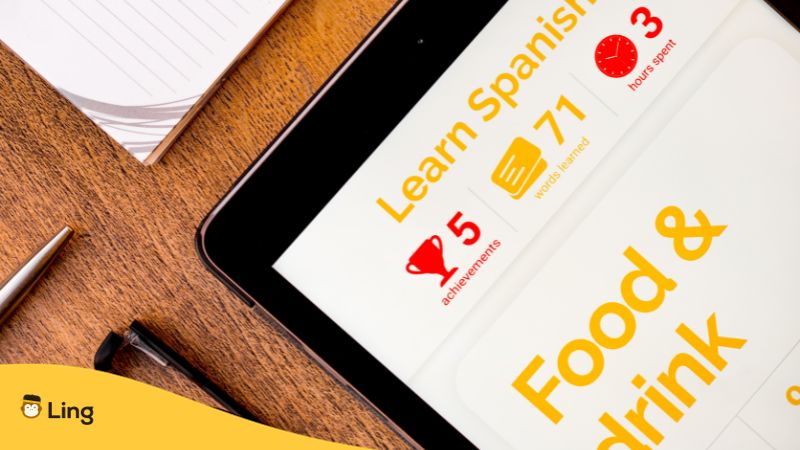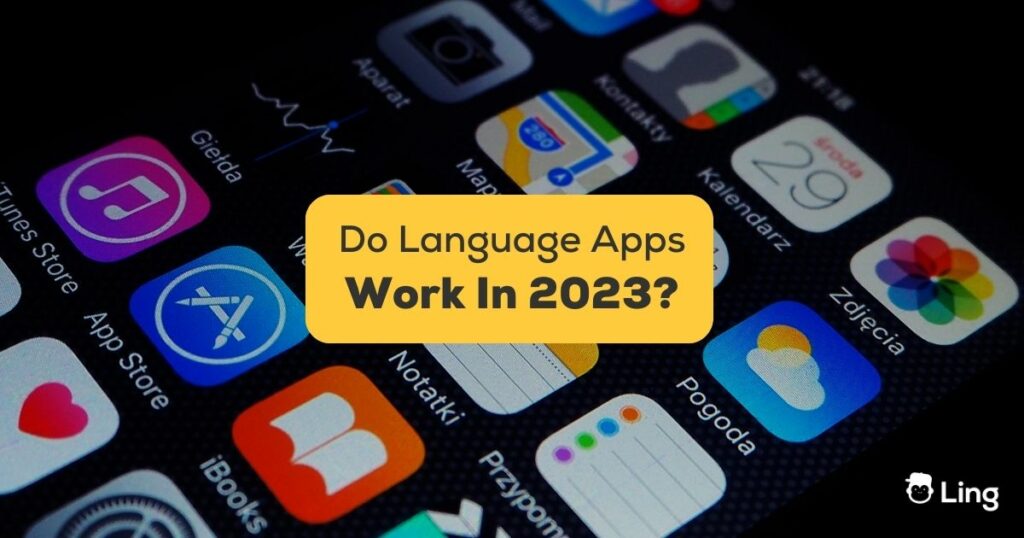Do you still remember when the world seems to have struck the pause button at the height of the pandemic? Borders felt hard closed, offices morphed into virtual hubs, and there we were – confined in our homes. For some, this extended break became a pass to catch up on those Netflix binges with the family. The others, like me, saw it as the perfect moment to level up their skill set.
Just a few weeks in, I already found myself toying with the idea of learning a new language. Sure, I do know that 5 years from now, I still have this rock-solid career as a writer, but at the same time, I know there’s this new trend in the field. This, my friends, is the emergence of multilingual employees! And shockingly, I wasn’t the only one who came to this conclusion. An intriguing report showed an uptick in wanna-be polyglots during the lockdown. And their resource of choice? You guessed right, language apps!
While cocooning across the globe, some of the crème-of-the-crop language learning apps, from Ling to Duolingo and Memrise, soaked up the limelight. These digital apps became an instant fave among casual learners since they offered the key to foreign languages for less than your daily cup of joe. And who will blame us for gravitating towards them? These apps are cost-effective, stress-free solutions to the age-old pressures of classroom learning or face-to-face tutorials. Plus, they are a chock-a-block of information with a zillion teaching styles to add just the right dollop of interest!
But let’s not beat around the bush. There’s learning for the sheer thrill, and then there’s the committed, sleeves-rolled-up kind of learning. So, the million-dollar question I’m asking is, do language apps truly deliver in 2023? Are they your ticket to linguistic mastery, or are they merely dressed-up gaming apps?
Let’s get to the bottom of this in this in-depth review.
Table Of Contents
The Rising Need For Foreign Languages
We don’t want to sound like a broken record, but the job market out there? It’s kind of like a reality TV show – intense, a little cutthroat, everyone is fighting for a spot. The worst part is that it’s happening in economies around the world. This is now leading applicants to consider amping up their skills to stand out. And the truth today? According to employers, one of the biggest deciding factors now is one’s ability for speaking multiple languages.

During our exclusive talk with professional HR Influencer and Keynote speaker Jim Stroud, a trusted voice on the Future of Work, he observed that being multilingual gives one an incredible advantage in today’s job market. He added that through knowing different languages, all doors will be opened for you. This is especially true for the firms that deal at an international level and are in search of employees who possess dextrous communication skill sets so as to communicate effectively and collaborate with the audiences across the globe.
“A search on the word “bilingual” returned 236,589 jobs on Indeed. The salary for those jobs ranged from $30K – $70K. A search on “multilingual” returned 8,092 jobs with salaries ranging from $35k – $90K… This tells me that the more languages you know, the more your earning potential grows, as multilingual jobs had higher salary ranges than bilingual jobs.“
Jim Stroud
HR Influencer
Author of “Content Is The New Sourcing”
Additionally, Dr. Fermin Diez, an adjunct professor of human resources at the National University of Singapore, Nanyang Technological University, and the Singapore Management University, made it clear that language skills aren’t enough. He added that cultural fluency is very valuable, and being familiar with multiple cultures is a big benefit.

Building on Dr. Diez’s insight, there should always be a dual focus when learning a language. You need to understand not only the words and expressions but also the cultural nuances and complexities associated with one language.
With this said, it is possible to say that foreign languages cannot be called any longer as “good to haves” but rather as assets enhancing employability and career prospects. This is further reinforced by the finding of a recent study that foreign language speakers can actually even earn a wage premium of about 11%, on average.
Why Do Language Apps Work In 2023
Convenience And Accessibility
Who wouldn’t want to turn to learning apps when 90% of students are doing it? It’s a digital classroom that can fit in your pocket, ready for you at any given moment. Gone are the days of heavy textbooks and dragging yourself out of bed. Now, with their pajamas still on, they have the world at their fingertips.
Take the Ling app as an example. It’s not like any other language-learning app you’ve seen before. This one is filled to the brim with innovative features. For example, it has a chatbot that lets you have simulated real conversations using words and phrases straight from your lessons. Pretend it’s like having a friend that acts patient every time you mess up “¿Cómo estás?” in Spanish for the hundredth time. And, as they log more hours, their confidence and motivation are bound to skyrocket.
But what sets it apart even more is that their lessons are compatible with gadgets people use every day. Like a phone or tablet, and that means students can learn whenever they want.
But wait a second!

As apps to learn languages become more and more popular, Dr. Mario Torres wants to remind us that even though we can get all the answers we want from our phones, it’s not a good idea to replace the traditional method just yet. He spent time as the Dean of Student Services watching foreign students learn Tagalog with digital tools, and this was his biggest lesson.
“I strongly believe that there is a lot of potential in using apps as a way to teach someone a language. They do make it easy after all. But simply memorizing words and phrases won’t do any good. The ability to communicate in another tongue requires you to be able to understand a variety of contexts.”
Mario S. Torres, PhD
Associate Professor
De La Salle University – Dasmariñas
So do language apps work in 2023? If we focus on its convenience and the fact that it can be used as a supplementary tool, we bet that they work.
Affordability
Remember when you wished you could speak Mandarin or Japanese? The price tag to master either of them in the past was a whopping $80,000. That’s way too expensive for anyone’s budget, especially for someone like me, who won’t even buy guacamole at Chipotle. But, if your goal is just to shoot the breeze with locals on your next Asian escapade, there’s a cheaper way: Language learning apps!
They’re only $5 per month! Sometimes even less than that! And these apps don’t come empty-handed. They give you an array of languages! They’re also not stingy with it either. Most have free trial lessons, so you can dip your toes in before jumping into the pool of linguistics (without breaking the bank). Just take Duolingo, for example. They’ve turned the language-learning world on its head by providing completely free courses, all while keeping the lights on through in-app advertisements.
Another best thing about these apps is how inclusive they are, removing barriers to spread language across everyone, everywhere. Case in point: in 2022, Ling offered 100% free app access to Ukrainian nationals, helping them navigate new linguistic and cultural landscapes during challenging times. Babbel, Mondly, and LingQ joined in on this too.

Vanessa Doutherd, an Educational Technology Specialist, found interest in the fact that there are plenty of language learning apps out there with low prices. Despite being on the cheaper side, their lessons still remain high-quality, flexible, and personalized. Traditional methods don’t even come close to what these apps can do. Even though they’re already cheap, just think about how much more money you’ll save with location-based discounts and special sales.
With all of these points considered, we believe that language-learning apps will remain a pocket-friendly option for everyone in 2023 and beyond.
Gamified Learning Experience For Motivation
Much like how play-based learning gets students thrilled and involved in a typical education setting, several language learning platforms have cleverly added game-like lessons. This method transforms the pursuit of knowledge into an exciting mission where you can get points, earn badges, and even compete against other learners. It’s brilliant because those rewards melt the fear most people have when learning something new while also catering to our love for games.
However, the appeal goes way past getting rewards or outperforming friends.
The true magic happens when these language-learning apps light a flame in us that is insatiable. As we push through levels, unlocking new lessons and taking on challenges, an overwhelming sense of pride and ownership over what we’ve learned is felt. And when motivation is high, learners are more likely to explore the language realm beyond the normal time constraints.

But wait! Even though the concept of games is great for motivation and can transform the educational landscape, it may not still be for everyone. Dr. Cecilia Genuino, an expert in language learning, shared with us her insights on this:
“I believe that the use of language-learning apps in enhancing the experiences and motivation of the learners depends on age, interest, personality, and aptitude. Younger generations may appreciate the apps but not the older generations learning L2; learners who are good in technology may enjoy the apps but not those who are not so good in technology.
Cecilia F. Genuino, PhD
Faculty, College of Graduate Studies and Teacher Education Research
Philippine Normal University, Manila
Considering all the factors above, we can say that gamification has revolutionized how we learn in schools and has been just as effective with language learning using apps. But there’s always a catch: It doesn’t work for everyone! The effectiveness of gamified learning can change from person to person, depending on age and interest.
Ownership Of The Learning Process
In traditional educational settings, you’ll often find a one-size-fits-all approach being used. All the students are given the same instruction, and that’s it. However, everyone learns differently, so this method is flawed. There are some students who might be fast learners and get bored due to this. Others might feel like they’re drowning in information because they need more time to grasp certain concepts. Individual differences are what makes us unique, and there’s no way we can just cram ourselves into this mold.
But then there are language apps. These apps empower people to take control of their learning journey. They simply let you go at your own pace while also giving you the resources you need to learn, track progress, and tailor a system that works for you. This approach ensures that learners are adequately challenged without feeling overwhelmed. It enables them to progress at a comfortable rate while visibly witnessing the fruits of their labor and celebrating milestones along the way.

Dr. Arnecillo, a multilingual who has learned English, German, and Koine Greek in addition to Filipino, echoes the importance of active engagement in the language learning process. He recalls the days before the rise of language learning apps when he used index cards to master vocabulary and grammatical rules for academic purposes.
“With or without the apps, a language learner has to take control in figuring out better ways for him or her to learn a language. After all, learning a new language as an adult, without the benefits of living with its native speakers, will not happen passively or by osmosis. A language learner must be actively engaged in utilizing available and accessible tools that are known for helping learners acquire competency in a language.”
Fidel A. Arnecillo, Jr., PhD
Lecturer in Philosophy
California State University, San Bernardino
When it comes to asking if language apps actually work, the answer isn’t black and white. Their efficacy, and ultimately their value, stems from whether or not a learner is willing to be proactive in the acquisition process. Although plugging away with app after app won’t hurt, it’s not going to help either. The real key here is dedication, which is how you can get the most out of these digital tools. Language apps are built to support and enhance your learning journey, but they can only do so much when you’re not actively engaged or motivated enough to learn.
Variety Of Languages Offered
Language learning apps must be a dream come true for polyglots. They’ve got a whole trove of languages to pick from — it’s like stepping into a world where language barriers don’t exist at all! You can learn something as random and rare as Welsh or take the unbeaten path in Africa to master Swahili. And if you’re looking for something completely different, there’s always Esperanto.
What sets modern apps like Ling, Babbel, and Mango Languages apart is that they work with experts from countless universities. These people know how to teach languages in the most simple way possible so anyone can understand with ease. It’s not like the old school days when you’d memorize words and definitions while being on strict watch by your teacher, either. These guys are friendly and want to help you learn their language!
Additionally, these apps play a crucial role in preserving and promoting lesser-known languages. Take Ling, for example, which offers lessons in Asian languages such as Tagalog, Thai, and Khmer. Although they may not get the same spotlight as French or Spanish, they should still be recognized for their own beauty. It could be true that these linguistic wonders get no love from language schools and resources. But don’t worry because modern language learning apps are here to bridge that gap and introduce the breathtaking world of languages right to your fingertips.

In a conversation with polyglot and language consultant Lindsay Williams emphasized how newer apps seem to “get” the students really well. Instead of just focusing on the common languages, most now feature the less commonly spoken ones that deserve attention.
The variety of languages available on these platforms undeniably captivates users worldwide. And it’s easy to see why. Not only does it open countless professional growth opportunities, but also presents an enhanced sense of global interconnectedness and mutual understanding. As we continue to advance through 2023 and beyond, the value of these benefits will continue to multiply.

What Research Says About Language Learning Apps
Language learning apps have been talked about by everyone from educators to linguists and people just trying to learn another language. Some say that traditional learning will always be the best way, but recent research is saying otherwise. Although it’s helpful to get into a classroom, in 2023, we now have the ability to carry a whole course on our phones. And if you need it, you can just throw on some headphones and start learning.
Want proof?
A study from 2020 discovered that learners who used language apps for just 10 minutes a day experienced a shocking increase in their Spanish vocabulary, grasp of grammar, and oral communication abilities. This was all done over a period of 12 weeks. The study, published in Foreign Language Annals, involved a sample size of 54 participants. Based on the pretest and post-test scores, it was revealed that language-learning apps have greatly improved their motivation and skills in the target language.
The effectiveness of language learning apps continues to be proven in a new study at Yokohama City University. In it, eight medical staff members and 10 students tested out an app for five minutes twice a day over the course of five days. Even with how busy they were, participants managed to add this task into their routine — which was made easier by the fact that they could use the app anywhere. And this new approach showed some great results too — participants took home higher self-assessment scores and showcased better confidence and competence with speaking and listening.
This year, we’ve also seen an impressive integration of artificial intelligence, voice recognition, and augmented reality, transforming traditional language lessons into immersive experiences. These apps are now adept at crafting personalized lessons that adapt to each user’s learning style, making the process of acquiring a new language feel less like a chore and more like an exciting journey.
In fact, a recent study confirmed that there are language learning applications that go beyond using AI in the structure of the lesson. Duolingo is one example. They use advanced AI-based learning algorithms that can predict when and where you should practice based on past success and recent achievements to adjust lessons that match your skill level. This feature could be useful for those who aim to use apps alone as their main resource for learning.
With the experts’ insights and the results of the mentioned studies considered, we firmly believe that language-learning apps work in 2023 and beyond. Today, learners from all walks of life can pick up a new language with ease, all thanks to the advances we’ve made in language learning. Not only do you have a pocket tutor that you can use whenever you want, but you also don’t need to dedicate hours of your life or money to learn at home. But like everything else worth doing, your level of success depends on how much commitment and consistency you put into it.
How To Effectively Use Language Learning Apps
Have you ever met someone who speaks multiple languages and thought, “Wow, that’s impressive!”? I sure have. It can be a real game-changer in the career world, opening doors you never thought possible. In this section, let’s talk about the best ways to make language learning apps work to improve your employability.
Identify The Most Relevant Language For Your Career Field
There is no denying that English is the most commonly spoken language. However, it doesn’t mean it’s the only one worth learning! There are a lot of foreign languages that you can learn to increase your chances of getting hired for your dream job.
For example, if you want to join the field of engineering, many universities are calling for future engineers to learn at least two different languages. There was even a study to see why so many universities were doing this and found out just how important fluency in multiple languages is for this profession. Having this unique skill makes it easier for engineers to think outside of the box and communicate clearly on complex projects that span across different cultures and geographies.
When exploring job portals, you’ll also notice hundreds of engineering opportunities in countries such as those in the Arab region, Germany, and Russia. This would show just how important knowing the languages spoken here is. This additional skill set will enhance your professional value and expand your potential for career growth and global exposure.
So, if you’re itching to give your career a turbo boost and grab that global exposure you’ve been dreaming of, always research what are the most relevant language for those. From there, you can look for the language learning apps that offer your target language.
Set Your Career-Related Language Goals
Before diving headfirst into the wonderful world of languages, take a moment to think about what you’re looking to achieve. If your goal is to break into IT in Japan, casual language skills won’t help. You need at least an intermediate level of Japanese proficiency or a JLPT N2 certificate. If you’re just looking for a retail position in China and want a good work certificate, aim for around HSK 5 or 6. For this, you can use language learning apps as an additional tool for test preparation.
Now, if you’re looking to inspire minds as an Auxiliar de Conversación or maybe as an EFL instructor, most countries won’t demand professional-level proficiency. But let’s not underestimate the power of good old conversation. Being able to chat comfortably in the local lingo can work wonders. For this, continuous use of language learning apps and informal tutorials should do the trick.
Use Language Apps To Improve Specific Skills
When you start looking into language learning apps, don’t get lost in all the bells and whistles. The flashy features can steal your attention from what’s important: finding an app that will cater to your specific goals.
For instance, let’s say you want to get better at holding conversations with a fine point. One of the best ways to do this is by talking to native speakers. And guess what? There are many apps that allow you to do so — Tandem, Hello Talk, and HiNative, just to name a few. If you want to refine your skills without facing a native speaker, you may also try out Ling’s chatbot feature.
On the other hand, if you’re trying to build up your vocab, then turn to the Spaced Repetition System (SRS). This learning hack is great for boosting memory, and it works just like flashcards: one side has a word, and the other has its translation. As you move along lessons, you’ll encounter the same words to keep your memory fresh. You can find this feature in top-tier apps like Memrise, Anki, and FluentU.
It is also important to find language apps that are customized for your intended purposes. For instance, if you want to improve your skills and learn business English instead of general English, you should get platforms like Business English Pod or VirtualSpeech. These apps are created to cater to professional learners, making sure that everything from sentence structures, vocabulary, and explanations, helps you reach your goals.
Use Language Apps That Touch On Cultural Points
Not all language apps are the same. If you want to learn beyond words and actually understand the cultural implications of expressions, then using language apps that touch on cultural nuances is the best choice. One best example of this is Mango Languages. Instead of teaching the basic words and expressions, they went out of their way to ensure learners build cultural competence. Their goal is to help learners meaningfully connect with native speakers, all while lessening the impact of culture shock.
In Nguyen’s study, they found that adding cultural elements to education has been an effective way to motivate students in their studies. This is a key factor behind language applications such as Ling’s decision to customize their lessons to suit the specific language in question. If you explore the app’s grammar section for Tagalog, you will find that it includes cultural references and even slang terms. These are all meant to provide a comprehensive understanding of how the language is used in the Philippines.
Track Your Progress And Celebrate Achievements
When using language learning apps to advance your career, one of the most important things to do is consistently track your progress. Always be sure to take a moment to celebrate the little accomplishments you make. Doing this can guarantee that you’re always on the right path to improving your language skills and moving closer to your target proficiency level.
The good news is that many language learning apps come with features like data tracking and progress reports. It’ll point out what areas of strength you have, the days when you were most productive, and which skills need more improvement. This is a very effective way for you to focus on what needs improving so that your efforts are always used in the most effective way possible.
Celebrating yourself will also help keep you motivated and committed throughout your language journey. It doesn’t matter if it’s a small task like finishing a particular vocabulary list or something bigger like completing an entire course. Give yourself some recognition for it all. Doing this will help remind you why you started in the first place and keep pushing forward.

Ready To Give Language Apps A Whirl?
The improvements in technology have changed how we learn languages. It’s now easier, more accessible, and fun. Language learning apps have become one of the most practical options for those wanting to learn a new language. This is because they provide a range of benefits, from personalized learning experiences to being affordable.
As we continue witnessing these tools evolve, it’s becoming clear that these apps are more than just a fad. They’re a resource that has the potential to reshape the way we acquire languages. So, if you have any doubts about downloading one of these apps, don’t! There’s never been a better time to give it a try and open the doors to new personal and professional opportunities.



































































